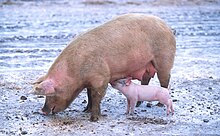swin
See also: świń
Middle English
Noun
swin
- Alternative form of swyn
Old English

Etymology
From Proto-West Germanic *swīn, from Proto-Germanic *swīną, from an adjectival form of Proto-Indo-European *sū-.
Cognate with Old Frisian swīn, Old Saxon swīn, Old Dutch *swīn, Old High German swīn, Old Norse svín, Gothic 𐍃𐍅𐌴𐌹𐌽 (swein).
Pronunciation
Noun
swīn n
- pig
- Swīn etaþ ealra cynna þing.
- Pigs eat all kinds of things.
- Swīn lyst simle bewealwian on solum.
- Pigs always like rolling around in the mud.
- unknown date, unknown author, Exeter Book, riddle 40
- Māra iċ eom and fǣtra þonne āmæsted swīn.
- I'm bigger and fatter than a fattened pig.
- pork
- 9th century, Bald's Leechbook
- Ne et nīewne ċīese, ne fersċe gōs, ne fersċne ǣl, ne fersċ swīn.
- Don't eat new cheese, fresh goose, fresh eel, or fresh pork.
- 9th century, Bald's Leechbook
Declension
Declension of swīn (strong a-stem)
Hyponyms
Derived terms
- mereswīn (“dolphin”)
- swīnen (“of or like a pig”)
- swīnhaga (“pigpen”)
- swīnhierde (“swineherd”)
Descendants
See also
- spiċ (“bacon”)
Categories:
- Middle English lemmas
- Middle English nouns
- Old English terms derived from Proto-West Germanic
- Old English terms inherited from Proto-West Germanic
- Old English terms inherited from Proto-Germanic
- Old English terms derived from Proto-Germanic
- Old English terms derived from Proto-Indo-European
- Old English terms with IPA pronunciation
- Old English lemmas
- Old English nouns
- Old English neuter nouns
- Old English terms with usage examples
- Old English terms with quotations
- Old English neuter a-stem nouns